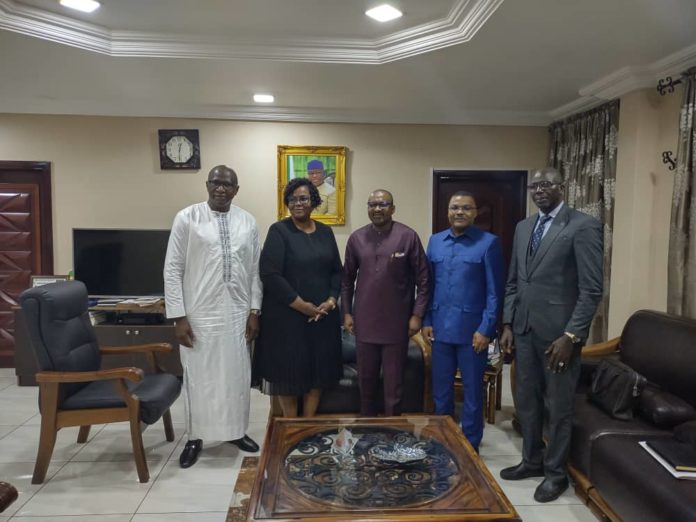By Hassan Gbassay
West African Bankers’ Association (WABA), Executive Committee, on Thursday March 16, request the government of Sierra Leone to grant the full membership of all Microfinance Institutions in Sierra Leone.
The Association’s President, Dr. Guy Laurent Fondjo, First Vice-President Aina Moore, Second Vice-President: Odele Alabi, Honorary President: Thieno Seydou Nourou Sy and Secretary General of WABA Alieu O. Ceesay, also request the government to sign the WABA Headquarters agreement, which was lost during the war period by the Minister of Foreign Affairs and International Cooperation on behalf of Sierra Leone Authorities and WABA.
The President WABA Dr. Guy Laurent Fondjo, made the request to the government through Vice President of Sierra Leone, Dr. Mohamed Juldeh Jalloh, stating that the Association has done and will continue to play a critical role in the development of the financial sector and overall financial stability, through intermediation, and the promotion of efficient payment and settlement systems.
“To help execute our mandate, it will be highly appreciated if your Excellency could assist us in the following areas. Signing of the WABA Headquarters agreement which was lost during the war period by the Honourable Minister of Foreign Affairs and International Cooperation on behalf of Sierra Leone Authorities and my humble self on behalf of WABA; The HQ Agreement is being finalized by our lawyer. To have full membership of all Microfinance Institutions in Sierra Leone in WABA because they create money and do banking activities as well, the Sierra Leone Stock exchange, Insurance Institutions, and encourage timely payment of contributions by commercial banks in the country through the support of the Bank of Sierra Leone as and when necessary,” he said.
He said WABA was created on August 10, 1981, by the Committee of Governors ECOWAS Central Banks, and brings together all primary banks, financial institutions, development banks, credit institutions, and professional bodies of the Banks and other non-bank financial institutions in the region.
He said the Association plays a critical role in the monetary and economic integration agenda of the region, being spearheaded by the ECOWAS Commission and other regional sister institutions and that they were working actively to build the capacity of the ECOWAS Banking and the overall Financial System, which is currently undergoing rapid change and is committed to the creation of a Regional Training Center in Banking, Finance and Microfinance to be located in Abuja Nigeria.
Vice President of Sierra Leone Dr. Mohamed Juldeh Jalloh, said looking at what is happening in the world and the growing realization that governments in the Africa region have been negatively impacted by COVID-19 and the Russia and Ukraine war has taught everyone that countries in Africa need to build national capability for food production, noting governments cannot get into production but they need the private sector to handle the food production.
He said the productive sector is very important and that infrastructure, digitalization and good road network which makes the private sector more important, noting that Africa has reached a stage where they need to start thinking creatively how to support domestic reflective capacity and domestic productive capacity and said he believed one big challenge we have today is access to finance.
He said lot of people are out there that can think creatively and want to establish businesses but they are constraint largely in terms of accessing financing e and the window for international financial and finance borrowing is almost closing down.
He said WABA should be thinking in that line or else, the productive sector is going to close down and the more the productive sector closes down is that more social problems will expand, due to lack of job, lack of adequate revenue and access to services.
He said since independence, there has never been an experience for a valuable productive sector to support social services delivery and that is why Africa has a situation where electricity, education, health care and more sectors will collapse and all of those sectors need the private sector for sustainable development.





